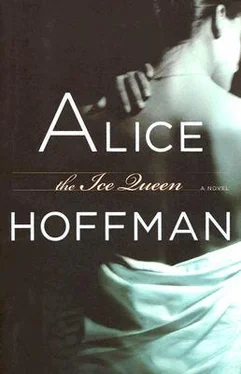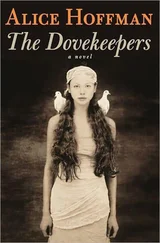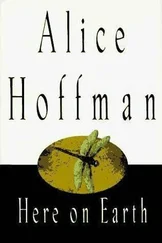“Hey, come into the kitchen,” he said. “I fixed you lunch.”
Just like that. Not interested. Next subject. The here and now . Lunch on the table. Like normal folks.
I followed him down the hall. I had a blank feeling, as if somebody had taken what little there was inside me and blown it away. Now I was sure — he’d never read the books on his shelf.
For lunch he’d fixed me hot tomato soup. He liked it cold himself, with ice mixed in. He poured himself a glass of fresh orange juice.
“Vitamin D,” he said.
He needed to think about such things. His complexion was pale; he was never in the sun. I thought he might be fading in front of my eyes. I thought about the field-worker who had half believed he was working for a monster. I sat at the table. We didn’t have much to say. Outside the oncoming dusk was undulating, moving between the clouds in waves of blue light. I felt heartbroken and I hadn’t even known I had a heart to break.
That’s the danger when you come to the middle of the story. You may find out more than you ever wanted to know.
We stayed in the kitchen and watched the light fading in the orchard. All that blue, all that light. If I stayed, I would rinse the dishes and he would rest his hands on the ice in the freezer, then come up behind me and touch me until I was burning. I’d let the tap water run. I’d put my cold, wet arms around him. But that’s not what happened that day. We were moving into the after; the then and the now and the soon will be were becoming separate realms. This had been happiness and we didn’t know it. We walked right past. Had no idea. Step after step.
I felt a stinging somewhere, a sharpness. We were waking from the dream of the kitchen, the afternoon, the way we wanted each other. When it grew dark we usually went into the bedroom, the bath. We were happy for the night. Now I was tired. It had been a long day. And we still weren’t done. I told him I didn’t feel well. I needed my sleep. I wasn’t ready to find out anything, I suppose. Not yet. I knew the truth would turn things around.
“Sorry,” I said when he walked me out to the porch.
“Sorry for what?”
For nothing. For everything. For all I was about to do.
“For being tired.”
He grabbed me and I kissed him until my mouth was burning. No ice. Not this time. He let me go, looked at me.
“I don’t want to hurt you,” Lazarus said.
That’s what they all said, and then they went ahead and did anyway. When I drove home, I felt bereft.
I’d lost something; I felt it as surely as I had when I lost the color red, a color I’d never even liked, one I avoided. Now every shade was faded without it, drained, not just scarlet and crimson and vermilion but even rust seemed gray; coppers and bronzes were flat without their red tones. Without red, the dawn was milk, rubies were worthless.
I didn’t trust him. That was the loss. Dropped like a stone into a pool. Not a word he said, not a book he’d read, not a fuck or a kiss or a look. Not a bowl of soup. Nothing.
I went home and there was my cat, tail waving back and forth, crouched by the hedge. Every flower was as white as chalk. She ignored me when I walked up the path, but came running when I opened the door to the screen porch. Foul-weather friend. She was due to be fed. She knew what she wanted; I was the one who couldn’t tell if she was purring or if her stomach was merely rumbling as she rubbed against my legs.
My porch. My key. My home. My nothing.
There was the shoebox, atop the carton filled with old newspapers, grocery bags, odds and ends. I couldn’t bring myself to bury the mole, and I couldn’t toss it out with the trash. I thought about Renny. We had been working on the Doric temple, and it was nearly done. He had to finish, and he’d been calling me, trying to set up a time when we could get together. But I was busy, too preoccupied to hear about his classes or how the mole he’d saved was thriving, getting fat on cream and grubs. I did agree to work with him on the coming Sunday, but he’d have to wait till then. I had my own problems to think about.
I peeked inside the box where the dead mole was kept. Some ants had gotten into the mess. There was a smell of damp skin, earth, rot. Nothing pretty. Nothing to keep. Looking at the box, I realized I couldn’t let go; not even of this. I’d been that way all my life, holding on tight. I couldn’t let go of anything.
Except for the things that mattered most.
I had an appointment with my cardiologist soon after. Craven. The man who insisted I had a heart. I’d stupidly complained of pain in my chest the last time I’d been to see him, and now he fitted me with a heart monitor that I was to wear for twenty-four hours.
“You have arrhythmia — and even though that’s not unusual for people who’ve experienced a strike, we want to be careful.”
“Is there some congenital defect that hadn’t been detected before?” I was thinking of that dreadful Andersen character whose heart is pierced by a shard of ice.
“You’re as normal as possible, given the circumstances,” Craven said. “We just like to keep watch. In case.”
I’d been calling in sick to the library in order to spend more time at the orchard with Lazarus. I’d pretty much used every excuse. Nausea, ears ringing, pain in my arm, my side, my everything. My ailments were half true at least, so my guilt didn’t sting as it might have, should have. Obsession did that, I presumed. The wanting of someone, something. The chances a person was suddenly willing to take, the lies so easy to tell. Frances York had never once questioned me or complained. Her generosity should have made it more difficult for me to be selfish, but it didn’t. After the doctor, I headed over to work. Once I’d parked and went in, I found I was looking forward to returning. I’d missed it, in fact. All those untrustworthy words were unspoken here, safely printed and bound up tight.
“Are you feeling better?” Frances asked when I arrived straight from my doctor’s appointment. It was late, hours past the time I should have shown up had I been working regularly. The weather was muggy and not even the old air-conditioning system could do much about that.
“I’m okay.”
Oh, sure. Only sex sick, love sick, lie sick.
Frances studied me. She might be losing her vision, but she was sharp. “Really?”
I pulled up my shirt and showed Frances the contraption strapped across my chest.
“And they said it was all right to come to work?”
Well, here was my chance, so I took it. “Probably not. I have an arrhythmia. They can track my heartbeat this way. But I feel like a horse in a harness. Or a mule.”
“You should definitely go home and rest,” Frances said.
I thought about Falada, that loyal horse who couldn’t help but speak the truth to the Goose Girl, even when his head had been cut off. I suppose I had a moment of remorse, a flash of honesty. It came over me as I stood behind the card catalog.
“I want to be the way I used to be.”
It was a stupid thing to say aloud. I didn’t even know what it meant. The me I used to be in what place and time? Yesterday? The day before my mother drove away from us? The minute before Renny suggested that Lazarus was hiding his truest self from me?
Frances was concerned. “Any recuperation takes time. Don’t rush yourself.”
She was making matters worse, being so thoughtful. No wonder I stayed away from kindness; in some ways it was worse than ill treatment. You could fight against cruelty, tooth and claw, but sympathy engulfed you, took you over, made you aware of all you’d done wrong. I realized I knew absolutely nothing about Frances, except the information I’d garnered from the photographs on her desk. Perhaps she also thought she knew me. I suppose she saw my empty cubicle and made her own assumptions. Poor thing, no photos whatsoever, no personal items, no personal life. And now that harness to chart her fluttering heart — why, it only adds to the already pitiful facts: the ridiculous pixie cut on a grown woman, the way she kneels down in the stacks, as though she had a penance to pay, and her dreadful pale skin. Poor creature. Poor me.
Читать дальше












